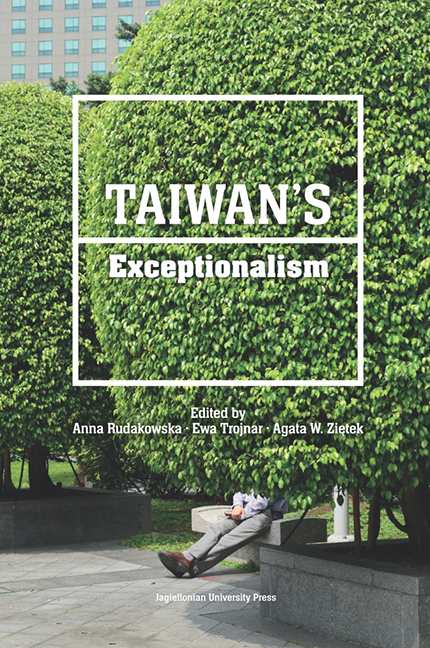Book contents
- Frontmatter
- Contents
- 1 Unpacking Taiwan's Exceptionalism: Themes and Studies
- 2 The Legal Status of Taiwan under International Law
- 3 Taiwan’s Unique Position Toward the South China Sea
- 4 Taiwan-China-United States Relations: Taiwan’s Unique Safe House for Better or Worse
- 5 Exceptionalism under a Glass Ceiling? Taiwan’s Democratic Development and Challenges
- 6 The Sunflower Movement: An Example of the Dynamics of Civic Activity in Taiwan
- 7 The Development of Indigenous Tourism Clusters in Taiwan: Economic and Cultural Foundations of Sustainability
- 8 A Shark Paradise in Taiwan (Dis)appears: From Shark Soup to Shark Diving
- 9 Taipei’s Soft Power at Work: The Image of Taiwan in Polish Dailies “Gazeta Wyborcza” and “Rzeczpospolita”
- Contributors
- List of Figures
- Index
5 - Exceptionalism under a Glass Ceiling? Taiwan’s Democratic Development and Challenges
Published online by Cambridge University Press: 16 July 2022
- Frontmatter
- Contents
- 1 Unpacking Taiwan's Exceptionalism: Themes and Studies
- 2 The Legal Status of Taiwan under International Law
- 3 Taiwan’s Unique Position Toward the South China Sea
- 4 Taiwan-China-United States Relations: Taiwan’s Unique Safe House for Better or Worse
- 5 Exceptionalism under a Glass Ceiling? Taiwan’s Democratic Development and Challenges
- 6 The Sunflower Movement: An Example of the Dynamics of Civic Activity in Taiwan
- 7 The Development of Indigenous Tourism Clusters in Taiwan: Economic and Cultural Foundations of Sustainability
- 8 A Shark Paradise in Taiwan (Dis)appears: From Shark Soup to Shark Diving
- 9 Taipei’s Soft Power at Work: The Image of Taiwan in Polish Dailies “Gazeta Wyborcza” and “Rzeczpospolita”
- Contributors
- List of Figures
- Index
Summary
Abstract: This chapter aims to address the question of the extent to which Taiwan's transformation and practice of democracy is exceptional. It is argued that in terms of the sources, process and outcomes of its political transformation and democratic development to date, Taiwan is indeed unique. In terms of sources, there are three major traditions supporting the claim that Taiwan's democracy is uniquely constructed. In addition, Taiwan's diplomatic isolation propelled it in various ways to pursue deeper democratization so as to maintain or strengthen its support and legitimacy. For the process dimension, in a Taiwanese-versus-mainlander bi-communal context, until the early 1990s, there was a transformation from a control model toward consociationalism. There is also a growing tendency to move further toward Lijphart's Majoritarian model of democracy. Coupled with the disconnection of the external dimensions of state-building from the internal ones, the overall process is exceptional. Insofar as the outcome or ‘end condition’ of democratic development is concerned, Taiwan has had certain achievements. Among them, the realization of an international review of its national human rights report as well as extending protection for LGBT rights are pioneering steps that testify further to Taiwan's exceptionalism. Nevertheless, there are also challenges ahead. These challenges include strengthening rule of law on the institutional side, ‘blackgold politics’ (political corruption), polarization of party politics, media and over-politicization in some policy areas, an increasing disaffection toward democracy, vested interests and monopolization of power resources in several sectors, incomplete protection of rights, the China factor, the Trump factor, and the reconcilability of Confucianism and Western individualism. These problems, if unaddressed, might constrain Taiwanese democracy from developing further to its full extent. Specifically, the status quo or exceptional ‘sovereignty deficit’ condition in which Taiwan is embroiled means that the exercise of self-determination by the Taiwanese would be virtually prohibited to such an extent that there is a ‘glass ceiling’ capping Taiwan's practice of democracy.
Keywords: exceptionalism in Taiwanese democracy, control, consociationalism, Majoritarianism, sovereignty deficit
- Type
- Chapter
- Information
- Taiwan's Exceptionalism , pp. 79 - 116Publisher: Jagiellonian University PressPrint publication year: 2022



